by Katherine Norris | Nov 12, 2019 | Academics, City of Abilene, COBA Faculty, Faculty Testimonials, Faith Infusion, Uncategorized
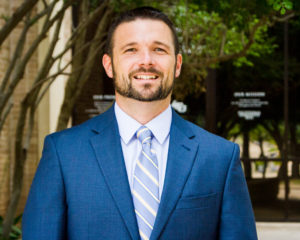
Dr. Dennis Marquardt
Dr. Dennis Marquardt, Assistant Professor of Management and Director of the Lytle Center for Faith and Leadership, is one of the great examples in COBA of a well-developed, strong, and Christ-like individual. He says, “I often laugh at the thought of telling my 20 year old self that one day he would be a college professor. The idea of being a professor was not even in the realm of my thought space when I graduated from college. My plan was to work a year in a business-related job and try to get into law school. Instead, for some reason, as an organizational communication major, I ended up getting hired for a tax and compliance job at Bankers Trust (which was soon acquired by Deutsche Bank). I really enjoyed the work I did for DB and started an MBA program with plans to continue my business career.”
Dr. Marquardt does well to share his experiences in the classroom and apply the class concepts to his failures and his accomplishments. The humility and grace that he shows earns him the highest respect from his students to his coworkers. Part of that is an incredible amount of faith that he shows through his actions and choices. “I’ve always prayed heavily for each career path I’ve been presented with and asked a lot of advice from others to get a wiser and more well-rounded faith-based perspective. It’s usually when I look in the rear-view mirror that I see God’s direction in my journey most clearly. Most of all, I am overwhelmed by His grace and mercy for the many times I’ve failed and/or chosen the wrong path (and that’s happened more than I’d like to admit).“
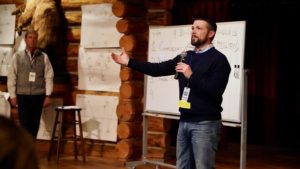
Marquardt teaching at Leadership Summit
When asked if and how his faith plays a role in his teaching he was enthusiastic to talk about how he sees God working through COBA. This was his response: “Absolutely. As a management professor, I see the role of “manager” as an incredibly noble calling. The research is quite conclusive regarding the significant impact a supervisor has on the subjective well-being and overall quality of life of his or her subordinates. What an incredible opportunity management is, then, for people of faith to live out the servant life promoted by Christ. I think much of the Human Relations movement in management is not only conducive to but also indirectly (and sometimes directly) draws from the characters and virtues found in the teachings and life of Jesus. One of my priorities is to make these connections evident in the classroom and to help students see that faith does impact our careers and should create cycles of virtue in the lives of employees and customers alike.”
Dr. Marquardt responded with this wisdom when asked what he has learned since being at COBA: “ACU and COBA values relationships and creates settings that allow for a more holistic approach to learning that spans beyond the four walls of the classroom. I think this is one of the key differentiators for ACU and it provides a mutual learning environment for professors and students. Not only do I get to facilitate learning but I am also challenged and sharpened by my students as I see them wrestling with new ideas and living and working out their own faith.”

Dennis and Monique Marquardt
Final Words: “Early in my teaching career I became deeply convicted about the intrinsic value potential of each and every class session. Each time students come into a classroom with any instructor I think there is something almost sacred about the possibilities. I was recently reminded of a poem by former longtime President of Morehouse College and spiritual mentor to Martin Luther King, Jr., Dr. Benjamin E. Mays that conveys this point:
I have only just a minute,
Only sixty seconds in it.
Forced upon me, can’t refuse it.
Didn’t seek it, didn’t choose it.
But it’s up to me
to use it.
I must suffer if I lose it.
Give account if I abuse it.
Just a tiny little minute,
but eternity is in it.
by Hanna Roberts | Jan 25, 2019 | Academics, City of Abilene, Current Students, Social Entrepreneurship, Uncategorized
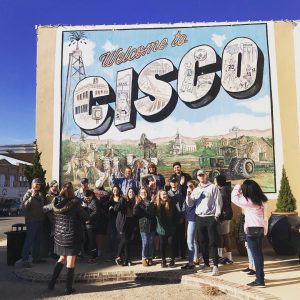
Business & Sustainability students take a tour of the newly revitalized Cisco Downtown.
In January, twenty-two students attended Dr. Sarah Easter’s Business & Sustainability course (MGMT 440), a one-week intensive class that educates students on the opportunities and challenges of developing more sustainable business strategies and practices, and to explore the changing role of business in society and in relation to the environment. “Typically in business, we focus on financial sustainability,” Dr. Easter explained. “We fail to consider the economic and social well-being aspects of sustainability, so this course looks at the impact businesses can have on the community and environment as well.” The course offers many different perspectives on sustainability, examining what that means for a variety of different companies, from large, global corporations to local, small businesses.
This was the third year that the course has been offered but the first year that Dr. Easter incorporated out-of-town field trips in addition to several guest speakers. The students spoke with Abilene business owners, several ACU professors from varying colleges, and with a panel of Cisco downtown business owners. Students took a tour around ACU with Corey Ruff, Associate Vice President of Operations, to understand the campus initiatives for sustainability on a deeper level. They also went to Disability Resources Inc., a residential community for individuals with intellectual disabilities.
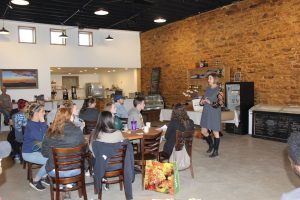
Cisco mayor Tammy Douglas speaks to Business & Sustainability students.
The students spent half a day in Cisco, TX. They spoke with Joy and Kerry Hedges, the owners of Slowpoke Farms and Slowpoke Market Store. The Hedges made significant lifestyle changes for sustainability regarding the food and products they consumed and extended those values beyond their personal life to their farming methods and business practices. In September, they opened the Slowpoke Market Store, which students were able to visit. The Slowpoke Market Store is a part of the revitalization effort in the downtown Cisco area. Students interacted with a panel of other business owners in the downtown area that are also involved with the revitalization efforts and with Tammy Douglas, Cisco’s first female mayor. Douglas explained the importance of local resources and how they have incorporated sustainable practices in the changes occurring in Cisco and gave students a tour of the downtown area.
By the end of the class, students were able to recognize interactions between environmental, social, and economic decisions, understand the power of business to negatively or positively impact their surroundings, gained exposure to how a variety of different organizations and perspectives tackle today’s sustainability challenges, and became more aware of their own role when participating in personal and professional decisions related to sustainability. Marissa Hickson, a senior marketing major, said that “the most impactful thing I learned in the class was the importance of researching the background, goals, and values of the companies I support. We learned how to evaluate sustainability reports and determine whether or not a company’s values align with ours. I learned that a lot of companies that I have trusted in the past don’t actually operate in the most ethical ways! It’s great to be aware of this now so that I can be sure to support the companies who are actively working to make our world a better place.” The class will be offered next January, so students can ask your advisor about this offering.
by Hanna Roberts | Oct 4, 2017 | Academics, City of Abilene, COBA Events, Distinguished Speakers Series, Faith Infusion, Special Speakers
 The Lytle Center for Faith and Leadership Development is an emerging organization within COBA. The mission of the Lytle Center is to challenge individuals to wholeheartedly follow Christ, equipping them to be leaders of integrity at home, work and in their community. The Lytle Center holds weekly chapel for students, with guest speakers from a variety of backgrounds who come speak to students about the ways in which they enact their faith in their leadership roles and how students can do the same. This semester, Lytle Center Chapel has had the pleasure of welcoming guests like Anthony Williams, the mayor of Abilene, who encouraged students to have the courage to get out of their comfort zones and face the issues before them in order to lead well.
The Lytle Center for Faith and Leadership Development is an emerging organization within COBA. The mission of the Lytle Center is to challenge individuals to wholeheartedly follow Christ, equipping them to be leaders of integrity at home, work and in their community. The Lytle Center holds weekly chapel for students, with guest speakers from a variety of backgrounds who come speak to students about the ways in which they enact their faith in their leadership roles and how students can do the same. This semester, Lytle Center Chapel has had the pleasure of welcoming guests like Anthony Williams, the mayor of Abilene, who encouraged students to have the courage to get out of their comfort zones and face the issues before them in order to lead well.
Students have enjoyed learning from community leaders and being able to participate in the founding and forming of the Lytle Center. A student-run Advisory Board meets once a month to talk about the progress of the Lytle Center, to brainstorm new ideas, and to strategize how goals for the Center can be reached. We think that the student involvement is key; their help in structuring the center is essential to establishing the value and utility students will receive by involvement. The Lytle Center wants students of all majors – not just business – to become involved. A significant part of the foundation and forming of the Lytle Center has focused on how leadership extends beyond the business world. The Lytle Center believes that all students, regardless of major or career path, need to have the tools to lead in an effective, Christ-like manner. We look forward to seeing increased participation with students all over ACU’s campus.
The Lytle Center has become the point organization for many of COBA’s pre-existing leadership programs, uniting them under one body. Now in its 20th year, Leadership Summit is being planned within the Lytle Center, with guests like 2014 Time Person of the Year, Kent Brantley and President of Kellogg U.S. Specialty Channels, Wendy Davidson, scheduled to speak at the January short-course held in Colorado. Additionally, the Lytle Center is home to the Distinguished Speaker Series, which brings in Fortune 500 executives from around the country to speak to students about Christian business leadership perspectives they have learned through trial and error in their own careers.
The Lytle Center is working to form small groups for students who are interested in being mentored by older peers and ACU faculty and staff. The center is also working with churches around the city of Abilene to get students more involved in college ministries. The Lytle Center is in the early stages of exploring and planning a week-long service project for Spring Break to South Texas to help relief efforts for the victims of Hurricane Harvey. The service trip will be open for all students to participate.
We are excited to see what the Lytle Center will become and where it will take our students. We envision a new generation of leaders coming forth from involvement with the Lytle Center who rely on their faith to be effective in their communities. Keep up to date with the Lytle Center as it grows and develops by liking the Facebook page and watch for events like Leadership Summit and Distinguished Speaker Series for a chance to get involved. You can learn more by going to their blog: http://blogs.acu.edu/lytlecenter/
“Whatever you do, work at it with all your heart, as working for the Lord, not for human masters.”
Colossians 3:23
by Neely Borger | Feb 26, 2014 | City of Abilene, COBA Events, Current Students, Springboard

The highly anticipated event we have all been waiting for is just around the corner! Registration for the seventh annual Springboard Ideas challenge is now open and ready to start accepting applicants for 2014. Springboard is a business plan competition that takes place each year through the Griggs Center for Entrepreneurship and Philanthropy. Contestants vary, including some who have ideas and are seeking to start a business and others who have already established small businesses. The cash prizes come from several local sponsors. This year, certain phases of the competition have changed. The initial application process has been revamped to make each transition phase flow more smoothly for applicants.
The competition includes three different divisions: the community-growth division, the community-small business division, and the college division. The first, second, and third place winners in each division will receive cash prizes. For the college division, the first place winner will receive $7,500, the second place winner will receive $3,000, and the third place winner will receive $1,000. In the community-growth division, the first place winner will receive $15,000, the second place winner will receive $5,000, and the third place winner will receive $1,000. For the community-small business, the first place winner will receive $5,000, the second place winner will receive $3,000, and the third place winner will receive $1,000. Applicants must be at least 18 years of age and be a permanent resident of one of the qualifying 19 counties surrounding the Abilene area.
To enter the competition, applicants must initially complete an online application and pay the registration fee. The online application deadline is 5 P.M. on March 7th. Once the judging panel has advanced chosen contestants on to the next phase of the competition, a mini-business plan must be submitted. The business plan should address the fundamental issues of interest to potential investors. This document should highlight the most important and interesting points of the business, which should give potential investors a general understanding of why this venture would succeed. Contestants who advance to the next phase of the competition qualify as finalists and must prepare a presentation for a live panel of judges. The exact date, time, and location will vary by division but will take place during the week of April 6-12, 2014. Participants will be given 10 minutes to present their idea to the judges and will then be subject to 10-15 minutes of Q&A from the judges.The final phase of the competition will be the awards dinner, which will take place on April 15th. All finalists will display their ideas as part of an exhibit hall before the dinner, and then the winners of each division will be announced during the dinner. This year, Stuart Crum, President for Bridgestone Retail Operations, will be speaking at the awards ceremony.
Students have represented COBA well in the past Springboard competitions. Typically, around 30-4 students from around campus enter the competition each year. Last year, senior Luke Luttrell won first place in the college division with his Right Route idea. Right Route is a mobile app similar to Google Maps but offers more route options, optimizing the fastest route between as many desired destinations. Dr. Brent Reeves and Dr. Brian Burton were two professors that helped Luke develop his idea for the app. Luke believes that COBA was absolutely fundamental to winning Springboard. He credits his success to the help of such great professors in COBA, reiterating how involved and willing they were to reach out and help him on his journey to success. Luke also praises the competition in regards to the process. He says, “Springboard gives students the opportunity to present an idea to a panel of investors with entrepreneurial experience, resulting in great feedback on the idea and business model.” Luke has learned to always seek entrepreneurial opportunities and encourages anyone with even the smallest idea to enter the competition. Springboard is a great opportunity to grow one’s entrepreneurial skills and gain relevant experience through a high value process and interaction with professional entrepreneurs.
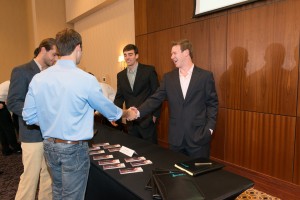
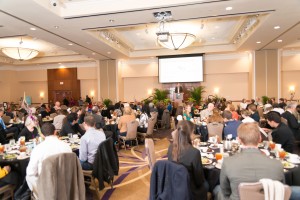
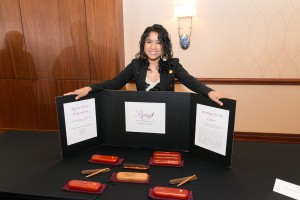
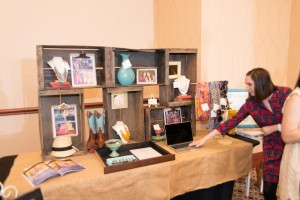
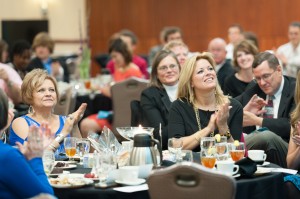
“The Springboard Ideas Challenge is a great opportunity for any student who is interested in entrepreneurial pursuits. It offers an unbelievable experience because it forces students to turn a simple idea into a fully functioning business model,” says Luke Luttrell, senior COBA student and winner of the 2013 Springboard Challenge.
by Amanda Pittman | Dec 1, 2011 | City of Abilene, College Decisions, Current Students, Faith Infusion
Students in Dr. Wright’s Creativity in the Marketplace (Marketing 440) class have been given a unique opportunity: to select a non-profit and use their marketing skills to solve a specific problem facing that non-profit. We had an opportunity to chat with the group leaders from two different groups to find out more about their non-profit and what they are doing to help.
Meet Corbin. He’s a senior marketing major from Coppell.

Corbin (he's the one jumping). This is in Europe when he went with ACU's Study Abroad for the semester.
His group is partnering with World’s Backyard, a non-profit started and based in Abilene. We asked him to share about their work. He’s what he told us:
1) Tell us a little about the details of the project:
The project was based on creatively helping a certain non profit overcome an obstacle they were facing. This involved figuring out the need these guys needed met most and doing whatever we thought would help the most. For my group it was helping the World’s Backyard (started by Brayden and Jason Boone), which is a simple organization that ministers to refugee children throughout Abilene.
2) How’d your group select your particular non-profit group?
Our group chose this non-profit because Brayden is one of my best friends and we had the opportunity to see tangible results from our help. (I’m also in involved with it so it made client contact easy.)
3) Tell us a little about your non-profit (what they do, how the help others) and how is your group helping them?
Essentially TWB links college students with various apartment complexes around Abilene that house foreign refugee children. Once a week they go and pick up these kids to take them to play soccer and other sports and games at Madison Middle School. The need they had was simply a matter of getting the name of their organization out there and telling people what they were about. We were able to do a small marketing campaign around campus and the apartment complexes for an event they hosted the weekend before Thanksgiving (it was actually a pushcart derby!)
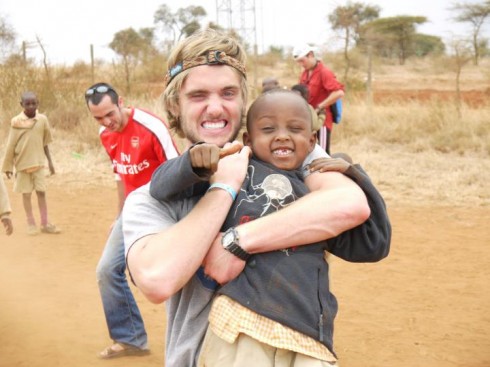
Corbin and a new friend
4) What are you learning about business through this project? How are your business skills being sharpened and refined?
I’m learning that marketing is something that must be tailored to each individual demographic (i.e.: we had to make advertisements in 4 different languages to reach all the families!) and also it is alot more motivating and rewarding to partner with people you care about on a deep personal level – I’m learning how to take that motivation into situations where I might not know the client as well and still be excited about the project and think creatively. This class has prepared me for that by discussing the necessity of creativity in a sometimes boring and straight laced professional world.
***
Next, meet Ashley. She’s a senior finance major from Hallsville.
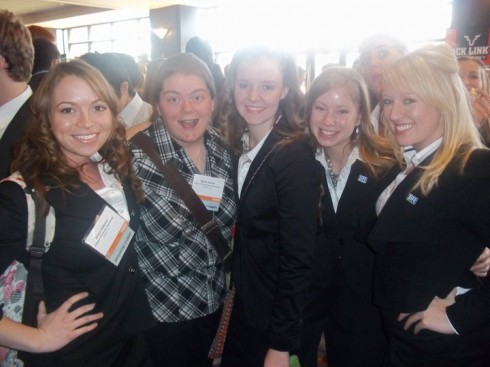
Ashley (far right). Pictured with COBA's SIFE team.
Ashley’s team is working with Operation Christmas Child, a seasonal project of Samaritan’s Purse. Here’s what she said about their non-profit and their project:
1) Tell us a little about the details of the project:
The assignment was to find a non profit and see if they needed help in any aspects of their business that we could solve using marketing. We then had to put that task in motion, or at least get the ball rolling. Ideally, we’d be able to come up with a solution to their marketing related problem, take the steps needed to accomplish it, and see results… All before the semester ended (which was about 5 weeks time).
2) How’d your group select your particular non-profit group?
We brainstormed numerous local nonprofits that we could easily get in touch with; then we focused on the actuality of us being able to do a real and effective job for them. We tried reaching out to one organization we thought might fit those criteria, but there was conflict in scheduling an initial meeting with them. This is when GW Shaw mentioned a project his church does every year and we decided to turn it into a marketing venture.

Operation Christmas Child table. The group set up in the Campus Center to promote this non-proft and to ask students to get involve and help out.
3) Tell us a little about your non-profit (what they do, how the help others) and how is your group helping them?
Operation Christmas Child is a national project hosted by Samaritan’s Purse. Their objective is to provide a box of small presents and necessities for underprivileged children in the Philippines. They are able to do this through a mass amount of volunteers (primarily churches) who fill up shoe boxes and drop them off at Samaritan Purse locations. GW was the only one in our group who had even heard about this project, so it was clear that we should bring awareness about it on campus through advertising and allowing students to get involved.
What we did: bought 100 foldable boxes from the website at a small cost. We set up an appropriately decorated table in the campus center with the boxes on them, in hopes that people would take them, fill them, and drop them back off at the table. We also put a big sign in the campus center, hung flyers in the dorms, made a my.acu login advertisement, made a slide for the chapel slideshow, and showed a one minute video during chapel on the day we set the table up.
We had a time span of two weeks for people to pick up, fill, and drop off the boxes. We had hoped for a return of 10 boxes, but we were pleasantly surprised when after exactly 7 days all of the boxes were gone. When it came time to pick up the boxes, there were a little over 20 full boxes which was double what we were expecting. So this project turned out to be a great success for the short amount of time we had.
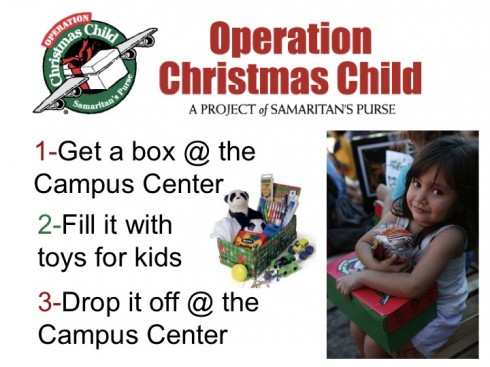
Chapel slide promoting table that was set up in the Campus Center
4) What are you learning about business through this project? How are your business skills being sharpened and refined?
I used to dread doing group projects; but in most of my upper level classes, group work has been enjoyable. I’ve learned to trust and lean on everyone by delegating the right tasks to the right people. It’s amazing to see how much more you can accomplish through correctly allocating tasks. Surpassing our project goal wasn’t a bad feeling either.
We are proud of these student groups who are learning how to use business to serve and grateful for the good work they are doing to help others. We are blessed with a faculty who excel at teaching business skills and who are even more committed to helping our students understand how they can use their knowledge and skills to make a difference in someone’s life.
by Amanda Pittman | Sep 4, 2011 | City of Abilene, COBA Events, College Decisions, Current Students
ACU’s chapter of Students In Free Enterprise (SIFE – a national organization formed by Sam Walton) does several projects with and for the community, using their business skills and knowledge to serve others. One project they do each year is with the elementary students over at Abilene Christian Schools. They set up a ‘little town’ in their school gym, with a bank, retail stores, a grocery store among others. Each student has a chance to earn a specific amount of money, and then they can turn around and either spend the money or save it at the bank – all under the guidance and teaching of our SIFE students and two business professors, Dr. Jinkerson and Dr. Vardiman.
The Abilene Reporter News recently did a story on teaching kids the value of money, and featured our SIFE team and professors. Click here for the full story. We’re proud of Dr. Jinkerson and Dr. Vardiman and the good work they are doing with our students!





 The Lytle Center for Faith and Leadership Development is an emerging organization within COBA. The mission of the Lytle Center is to challenge individuals to wholeheartedly follow Christ, equipping them to be leaders of integrity at home, work and in their community. The Lytle Center holds weekly chapel for students, with guest speakers from a variety of backgrounds who come speak to students about the ways in which they enact their faith in their leadership roles and how students can do the same. This semester, Lytle Center Chapel has had the pleasure of welcoming guests like Anthony Williams, the mayor of Abilene, who encouraged students to have the courage to get out of their comfort zones and face the issues before them in order to lead well.
The Lytle Center for Faith and Leadership Development is an emerging organization within COBA. The mission of the Lytle Center is to challenge individuals to wholeheartedly follow Christ, equipping them to be leaders of integrity at home, work and in their community. The Lytle Center holds weekly chapel for students, with guest speakers from a variety of backgrounds who come speak to students about the ways in which they enact their faith in their leadership roles and how students can do the same. This semester, Lytle Center Chapel has had the pleasure of welcoming guests like Anthony Williams, the mayor of Abilene, who encouraged students to have the courage to get out of their comfort zones and face the issues before them in order to lead well.









